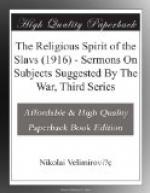Life is a drama, a tragic drama even, and not at all a metaphysical immobility or a quasi-mobility, or even an eternal circulus viciosus. There are three stages of human life: the first stage before the sin, in God-like naivete, the second in sin, and the third after the atonement, life in perfection, when there will be “a new earth and a new heaven.” We are in the middle stage, where life means sin and atonement, therefore in the most tragic stage. Life in the first and third stages may consist entirely in contemplation, but the life which we are actually living consists of deeds, of sins and virtues, i.e., of the struggle between good and evil, of suffering and purification, of a tragic heroism, of atonement.
DREAMS ABOUT THE REALITY.
It was not until the decline of the glorious Byzantine Empire that the Slavs embraced Christianity. For nine hundred years the Greeks were the principal representatives, protectors, elaborators and explorers of Christianity. When the Greeks visited the Slav country with their divine message, the Slavs were heathens. Their heathenism was like a confusing dream. Nature stood before them with its contradictory forces. The primitive Slavs regarded all the forces of Nature encircling a human creature as being alive and stronger than this creature. All the forces, whether friendly or unfriendly to man, are man like, anthropomorphic, and none of them are indifferent to human life and doings. The practical conclusion come to was: men must give sacrifices to both of them, to the good and to the evil; to the good in order to encourage them to be more good, to the evil in order to induce them to be less evil. It was necessary to pray equally to the good as to the evil gods. The best worship was the best balance between the good and bad spirits; not to offend any of them, but to be reconciled with all of them! Skilful diplomacy was indeed needed in worshipping all the terrible, invisible representatives of the forces of Nature seemingly fighting around man and because of man. And men are too weak to take their part decisively in one or other fighting camp. Everything useful or beautiful for men was regarded as being possessed by a good god or spirit. Everything dangerous and unfriendly was considered to be possessed by an evil god or spirit. The supreme god Perun, supreme because the strongest, was considered as acting equally for good and for evil. The curious fact is that the supreme divinity in every pagan theology was imagined to be acting equally strongly for good and for evil, as Zeus Jupiter, Wothan. You cannot call Zeus or Jupiter or Wothan or Perun a good god, but only a mighty god. With Christianity came into the world, including the Slav world, decisiveness, and every confusion disappeared. The Slavs learned to know that they could not serve two masters, but only one, and that they had not to balance between good and evil but to go straightway on the side of good.




